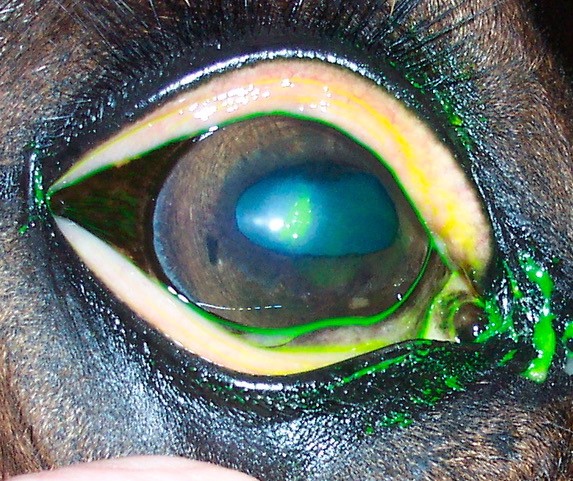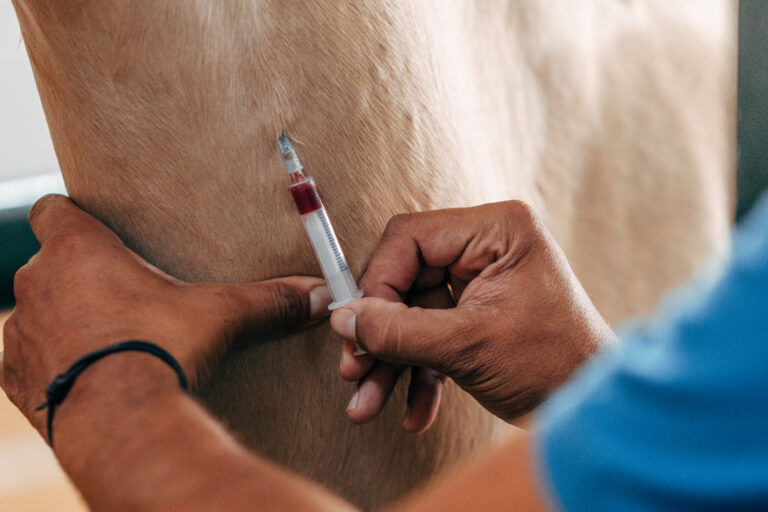
In Episode 70 of the Disease Du Jour podcast, we talked to you about equine ophthalmic emergencies, and we know corneal ulcers are high on that list. So, in Episode 84, we focus on corneal ulcers with Dr. Ann Dwyer, of Genesee Valley Equine Clinic in New York, who has practiced at Genesee Valley Equine Clinic since earning her veterinary degree from Cornell in 1983.
“In our practice, corneal ulcers are an ocular emergency,” said Dwyer. “Over five years of reviewing cases, we had 557 urgent ocular cases, with 380 of them corneal ulcers.”
She advised that every equine veterinary vehicle have an “eye kit” that includes at the minimum sedation, blocks/topical anesthesia, a bright light, an ophthalmoscope, a camera and fluorescein stain.
Topics covered in this podcast:
- What is a corneal ulcer?
- Are corneal ulcers a common problem for horses?
- What signs does a horse show if it has a corneal ulcer?
- How do you examine a horse on the farm to see if an ulcer is present?
- Veterinarians should take a cytology sample on most cases. How do you do that and what information does that add to the plan?
- Since cytology reveals that not all ulcers are the same, let’s go down the list, from simple to complex, and hear how you diagnose and treat the different types of ulcers. Let’s start with a simple, superficial ulcer.
- Now tell me about indolent ulcers—superficial ulcers that just do not heal. How do you diagnose and treat those?
- In the Northeast you also often see ulcers that will not heal because burdock bristles get embedded in the haired or third eyelid. Tell me about those.
- Sometimes corneal ulcers involve mineral deposits in the cornea, a condition called calcific keratopathy. How do you know if mineral is present and what can you do about it?
- What is eosinophilic keratitis, an unusual condition that can involve an allergic reaction, possibly to insects or parasites. What distinguishes this variant and how do you treat it?
- Sometimes the corneal surface is disrupted due to a blistering that follows corneal edema or swelling. How is this different from the other conditions?
- How do you diagnose and treat bacterial and fungal infections of the eye?
- Veterinarians treating corneal problems might need a polypharmacy! Can you summarize the major drugs that are used?
- You have mentioned SPLs, or subpalpebral lavage systems, as a necessary aid for treating serious corneal ulcers. Can these devices be inserted on the farm and managed at home?
- Final words of wisdom?
About Dr. Ann Dwyer
Dr. Ann Dwyer, of Genesee Valley Equine Clinic in New York, has practiced at Genesee Valley Equine Clinic since earning her veterinary degree from Cornell in 1983. During her career, she has pursued interests in equine ophthalmology. She lectures nationally and internationally and has published multiple papers and book chapters on equine ophthalmology, including Ophthalmic Emergencies in the Field published this year. In 2012 she was named an honorary member of the American College of Veterinary Ophthalmology. Dwyer served as the 2013 AAEP president and is currently vice chair of the Advisory Council for the veterinary college at Cornell, is a member of the Cornell Zweig Committee (Harry M. Zweig Memorial Fund for Equine Research), and she is on AVMA’s Council on Education.








